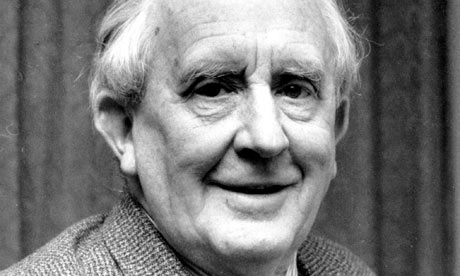Lord of the Rings author's previously unseen 200-page poem of Arthurian legend draws on tales of ancient Britain rather than Middle-earth

JRR Tolkien ... 'new' book out next year. Photograph: AP
It's the story of a dark world, of knights and princesses, swords and sorcery, quests and betrayals, and it's from the pen of JRR Tolkien. But this is not Middle-earth, it's ancient Britain, and this previously unpublished work from the Lord of the Rings author stars not Aragorn, Gandalf and Frodo, but King Arthur.
HarperCollins has announced the acquisition of Tolkien's never-before-published poem The Fall of Arthur, which will be released for the first time next May. Running to more than 200 pages, Tolkien's story was inspired by Geoffrey of Monmouth and Thomas Malory's tales of King Arthur, and is told in narrative verse. Set in the last days of Arthur's reign, the poem sees Tolkien tackling the old king's battle to save his country from Mordred the usurper, opening as Arthur and Gawain go to war.
"It is well known that a prominent strain in my father's poetry was his abiding love for the old 'Northern' alliterative verse," said Tolkien's son, Christopher Tolkien, who has edited the book and provided commentary. "In Sir Gawain and the Green Knight he displayed his skill in his rendering of the alliterative verse of the 14th century into the same metre in modern English. To these is now added his unfinished and unpublished poem The Fall of Arthur."
Tolkien began writing The Fall of Arthur a few years before he wrote The Hobbit. Its publication is the latest in a series of "new" releases from the author, including The Legend of Sigurd and Gudrún in 2009 and the unfinished Middle-Earth story The Children of Húrin in 2007.
For the book's editor at HarperCollins, Chris Smith, the news that Tolkien had finished work on The Fall of Arthur was an unexpected surprise. "Though its title had been known from Humphrey Carpenter's Biography and JRR Tolkien's own letters, we never supposed that it would see the light of day," he said.
He described the previously unpublished work as "extraordinary", saying that it "breathes new life into one of our greatest heroes, liberating him from the clutches of Malory's romantic treatment, and revealing Arthur as a complex, all-too human individual who must rise above the greatest of betrayals to liberate his beloved kingdom".
He added that, "though Tolkien's use of alliterative verse will mean the poem is of more specialised interest than his other work, we would like to think that the subject of King Arthur is one that will resonate with readers of his more celebrated works."
"In The Fall of Arthur we find themes of lost identity, betrayal, and sacrifice for greater glory, which have their echoes in other works, such as The Lord of the Rings, but anyone looking for closer connections will find no wizards or magic swords. In this respect The Fall of Arthur is closer to Sir Gawain and the Green Knight or The Legend of Sigurd and Gudrún."
These are the "new" poem's opening lines:
"Arthur eastward in arms purposed
his war to wage on the wild marches,
over seas sailing to Saxon lands,
from the Roman realm ruin defending.
Thus the tides of time to turn backward
and the heathen to humble, his hope urged him,
that with harrying ships they should hunt no more
on the shining shores and shallow waters
of South Britain, booty seeking."
his war to wage on the wild marches,
over seas sailing to Saxon lands,
from the Roman realm ruin defending.
Thus the tides of time to turn backward
and the heathen to humble, his hope urged him,
that with harrying ships they should hunt no more
on the shining shores and shallow waters
of South Britain, booty seeking."
John Garth, author of Tolkien and the Great War, said that from the fragments he had seen, the omens looked good. "In The Fall of Arthur, Tolkien depicts Arthur going off to fight the Saxons in Mirkwood – not the Mirkwood of Middle-earth, but the great German forests. Whether it's as good as the best by Tolkien will have to wait on the full publication, but snippets published so far are encouraging, showing him in darkly evocative mode writing about one of the great English villains, Mordred: 'His bed was barren; there black phantoms/ of desire unsated and savage fury/ in his brain brooded till bleak morning.'
"Any addition to the Arthurian tradition by a major author is welcome; this one is also exciting because of what it adds to our picture of a great modern imagination."
